Related Research Articles

The Council of Europe is an international organisation with the goal of upholding human rights, democracy and the rule of law in Europe. Founded in 1949, it brings together 46 member states with a population of approximately 675 million as of 2023; it operates with an annual budget of approximately 500 million euros.
International human rights law (IHRL) is the body of international law designed to promote human rights on social, regional, and domestic levels. As a form of international law, international human rights law is primarily made up of treaties, agreements between sovereign states intended to have binding legal effect between the parties that have agreed to them; and customary international law. Other international human rights instruments, while not legally binding, contribute to the implementation, understanding and development of international human rights law and have been recognized as a source of political obligation.

The BernConvention on the Conservation of European Wildlife and Natural Habitats, also known as the Bern Convention, is a binding international legal instrument in the field of Nature Conservation, it covers the natural heritage in Europe, as well as in some African countries. The Convention was open for signature on 19 September 1979 and came into force on 1 June 1982. It is particularly concerned about protecting natural habitats and endangered species, including migratory species.

The Framework Convention for the Protection of National Minorities (FCNM) is a multilateral treaty of the Council of Europe aimed at protecting the rights of minorities. It came into effect in 1998 and by 2009 it had been ratified by 39 member states.
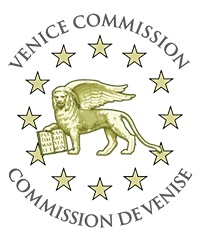
The Venice Commission, officially European Commission for Democracy through Law, is an advisory body of the Council of Europe, composed of independent experts in the field of constitutional law. It was created in 1990 after the fall of the Berlin Wall, at a time of urgent need for constitutional assistance in Central and Eastern Europe.

The International Institute for Democracy and Electoral Assistance is an intergovernmental organization that works to support and strengthen democratic institutions and processes around the world, to develop sustainable, effective and legitimate democracies. It has regional offices in Europe, Latin America and the Caribbean, Asia and the Pacific, Africa and West Asia, and North America. The organization is headquartered in Stockholm, Sweden.
The Geneva International Centre for Humanitarian Demining is an international organisation working in mine action and explosive ordnance risk reduction, with a focus on landmines, cluster munitions and ammunition stockpiles. Based in the Maison de la paix in Geneva, it is legally a non-profit foundation in Switzerland.

The Consolidation of the Justice System in Albania (EURALIUS) was an EU funded technical assistance project that sought the strengthening of the Albanian Justice System. The objective of EURALIUS was to strengthen the independence, transparency, efficiency, accountability and public trust in the Albanian justice system in line with the EU Acquis and best practices. EURALIUS was composed of long-term international experts from various EU Member States and of Albanian legal professionals who act as national experts, as well as support staff consisting of project assistants, translators, etc.
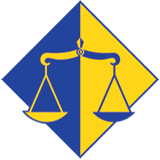
The High Judicial and Prosecutorial Council of Bosnia and Herzegovina is the national council of the judiciary of Bosnia and Herzegovina. It is the self-regulatory body of the judiciary in the country, tasked with guaranteeing its independence, with countrywide competences over the administration and career management of judicial office holders. It is based on the continental tradition of self-management of the judiciary.

The Group of States against Corruption is the Council of Europe's anti-corruption monitoring body with its headquarters in Strasbourg (France). It was established in 1999 as an enlarged partial agreement by 17 Council of Europe member states.

The European Directorate for the Quality of Medicines & HealthCare (EDQM) is a Directorate and partial agreement of the Council of Europe that traces its origins and statutes to the Convention on the Elaboration of a European Pharmacopoeia.
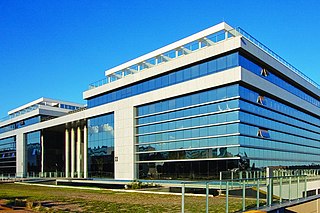
The National Council of Justice (CNJ) is an administrative and oversight organ of the Brazilian Judiciary created by constitutional amendment in 2004 as a part of judicial reform. Among its responsibilities are ensuring that the judicial system remains autonomous, conducting disciplinary proceedings against members of the Judiciary, and compiling and publishing statistics on the Brazilian court system. The Council has nationwide jurisdiction over all courts except the Supreme Federal Court, but makes no rulings on cases and does not review judgements of other courts. Its fifteen members are chosen by the Supreme Federal Court for two-year terms.

The judiciary of Malta interprets and applies the laws of Malta, to ensure equal justice under law, and to provide a mechanism for dispute resolution. The legal system of Malta is based partially on English law and partly on Continental law, whilst also being subject to European Union law.
The California Council on Criminal Justice (CCCJ) is an entity of the government of California that acts as the supervisory board concerning federal grants by the Office of Justice Programs (OJP) and an advisory board for other requirements of the Omnibus Crime Control and Safe Streets Act of 1968 and the Juvenile Delinquency Prevention and Control Act of 1968. It was created by the Deukmejian-Moretti Act of 1967.

The Council of Europe was founded on 5 May 1949 by ten western and northern European states, with Greece joining three months later, and Iceland, Turkey and West Germany joining the next year. It now has 46 member states, with Montenegro being the latest to join.

MONEYVAL is the official denomination of the Committee of Experts on the Evaluation of Anti-Money Laundering Measures and the Financing of Terrorism. It is a permanent monitoring body of the Council of Europe with 35 member states and jurisdictions out of which 32 are assessed exclusively by MONEYVAL.
The Ministry of Justice of the Republic of Uzbekistan,, is the central government body charged consistent implementation of a single state policy in the sphere of lawmaking and law enforcement practice in Uzbekistan.

The International Development Law Organization (IDLO) is an intergovernmental organization dedicated to the promotion of the rule of law.
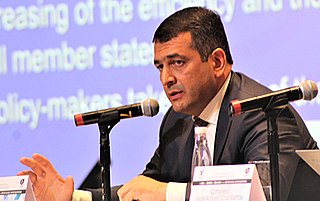
Ramin Afad oglu Gurbanov (Garagurbanlı) is an Azerbaijani lawyer, scholar, and the current president of the European Commission for the Efficiency of Justice (CEPEJ) of the Council of Europe. He is also a judge of the Baku Court of Appeal, a member of the Management Board of the Union of Associations of Judges of the Republic of Azerbaijan, and the Head of the Department of International Law of the Institute of Law and Human Rights at the Azerbaijan National Academy of Sciences. He is a Doctor of Law and Professor of the Department of Civil Law Disciplines at the Russian University of Economics.
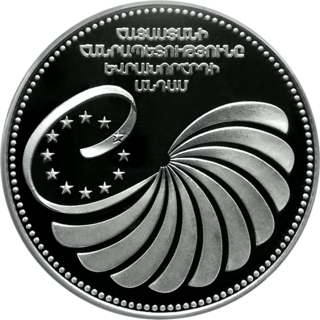
Armenia has been a member of the Council of Europe, an international organization that focuses on strengthening democracy, human rights, and the rule of law across Europe, since 2001.
References
- ↑ Rule of Law Initiative Granted Observer Status at European Commission for Efficiency of Justice, American Bar Association , March 2007
- ↑ "15 years serving justice in Europe". rm.coe.int. Council of Europe. Retrieved 2020-03-29.
- ↑ "Президентом СЕПЕЖ Совета Европы впервые стал гражданин Азербайджана". azerros.com. Azerros. 2018-12-07. Retrieved 2020-03-29.
- ↑ "Word from the President of the European Commission for the Efficiency of justice (CEPEJ) - European Commission for the Efficiency of Justice (CEPEJ) - publi.coe.int". European Commission for the Efficiency of Justice (CEPEJ). Retrieved 2023-01-27.